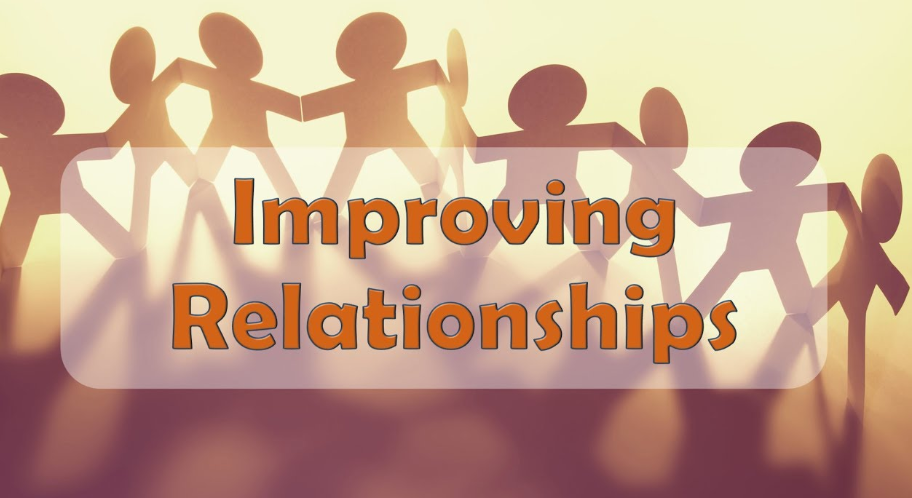If you’re looking to improve Your Relationships, there are many ways you can do so. The key is understanding what you and your partner need from you to be happy together.
Healthy relationships are characterized by trust, mutual respect, openness, honesty, and affection. Learn how to make your relationships better by using these tips.
Be Respectful
Respect is an essential ingredient in any healthy relationship. It shows your partner you value their opinions, passions, and values.
Mutual respect is vital for all kinds of relationships, whether business, artistic, friendly, or romantic. It can help you weather the ups and downs of life, enabling you to grow together as a couple.
One of the best ways to show respect in a relationship is by listening carefully to your partner. This helps you understand their wants and needs, what makes them happy, and what makes them feel safe.
It also allows you to be a better listener yourself. You’ll learn more about yourself and what you need to be successful in a healthy relationship.
A partner who doesn’t respect you isn’t someone you want in your life. Disrespect is never okay, and it’s a big part of what drives unhealthy relationships.
Be Honest
Honesty is a great place to start if you want to improve your relationships. It fosters respect, trust, and love between people.
Honesty also helps you to avoid conflicts and misunderstandings in your relationship. This is because it reassures your partner that you’re honest and don’t hide things from them.
It also makes your relationship more enjoyable by cutting out the guessing games often part of a relationship. It also prevents resentment from developing.
Studies show that honest people are happier than those who aren’t. They report fewer health problems and less anxiety. They also have more energy and enjoy better sleep.

Be Compassionate
Compassion is a natural quality that can make your relationships more intimate. It also improves your health and well-being by reducing stress, anxiety, and depression.
It is the ability to feel what others are feeling and motivates prosocial behaviors that benefit both you and them. In addition, compassion can improve your social, spiritual, and ecological connections.
Compassionate in your workplace can help you achieve better work results and foster stronger relationships with colleagues. It can also help you reduce stress and burnout.
Becoming more compassionate with your spouse can improve your relationship by making you more sensitive to their feelings and allowing you to build stronger bonds. You will need to practice this skill to improve and learn how to communicate compassionately.
Try to think from your heart instead of your head to improve your compassion skills. This will help you develop empathy and compassion more readily. It also allows you to stay more present, which can help you avoid ruminating about past events and worries in the future.
Be a Good Listener
People will be more willing to open up with you when you are a good listener. They will feel less afraid of being judged or having their issues invalidated.
You can be a good listener by understanding your partner’s perspective and emotions. You will also need to pay attention to their nonverbal cues.
The most common relationship problems stem from not listening to the other person’s point of view. A good listener is essential for a healthy relationship, whether with your spouse, colleague, or friend.
During your conversation, you can also ask questions that clarify the speaker’s assumptions or help them see their issue in a new light. By doing this, you can show them that you are interested in their views and ensure they get the information they need to make an informed decision.
The best listeners never hijack a conversation by talking over the speaker or injecting their opinions, beliefs, or fixes. They let the speaker talk through their emotions and then offer support and encouragement to them.

Be Committed
The ability to commit to something is one of the essential qualities of a successful person. Whether it’s a career, a relationship, or a hobby, commitment means you are willing to work hard toward your goal.
It also means you are committed to progressing even when challenges arise. It’s an excellent trait for relationships because it shows that you’re willing to stick with your partner and do whatever it takes to keep things together.
In the workplace, commitment is also an important indicator of job performance. Employees are more likely to stay with a company that encourages commitment and provides opportunities for growth and development.
Commitment can also help you to develop strong self-confidence. When you commit to something, you talk yourself into a mindset that will help you achieve your goals and get what you want.
It’s also helpful when deciding what path to take in life. Committing to a specific course of action can make choosing what’s best for you and your career easier.
Be Affirmative
Affirmative is a word that means to agree with or to approve of something. In English, this word is most often used to describe a verb or noun subject to a grammatical clause, like “John is a boy” or “Joe is here.”
The most important part of being an affirmative person is honesty. This skill can be taught and honed through practice and repetition. Affirmative people are often eager to please and can be overly sensitive to negative criticisms.
Affirmative people also make great team players because they are generally more loyal and less likely to leave their jobs behind. They are more likely to take the initiative to help others when needed, which can be a boon for teams that lack it. They are also more likely to try new things and have a more positive attitude about failure and the unexpected. In the long run, these characteristics will pay off through improved productivity and satisfaction for everyone involved.
Be Balanced
Finding a balance between your time together and time apart as a couple is essential for keeping your relationship healthy. This also applies to your relationships with friends and family.
A balanced relationship involves equal communication and respecting each other’s boundaries. It’s also about allowing your partner to be independent with their own needs and desires.
Relationships can become imbalanced if one or both partners make decisions about their lives without consulting the other. This could include things like career changes or movement.
You can learn how to properly balance these different aspects of your life by understanding your priorities and working with your partner to find a work-life balance that works for both of you. If you struggle to maintain this balance, consider talking to a therapist for guidance.
Be Independent
When it comes to relationships, you need to ensure that you and your partner are independent. Too much reliance on each other can create an unhealthy situation for both parties.
A sense of independence can help you feel more confident and empowered to take on the world. It allows you to try new things and discover your strengths and talents.
Taking control of your own life is also good for your mental health. It helps you build confidence in your ability to take care of yourself and make good decisions that are right for you.
As a result, you can avoid toxic relationships that can hurt your self-esteem. Instead, focus on building a solid sense of yourself and developing your values and goals.
In addition, be sure to maintain solid friendships with friends and family. This shows that you are a strong person and can also help you through tough times.

is an American author, blogger, and cybersecurity specialist based in Florida. He developed an interest in writing during his school years, which later led him to create content aimed at raising awareness about various forms of online scams, particularly in the world of online dating.
On his platform, Scam Service Report, Hall shares analytical articles and practical advice to help users recognize and avoid traps set by scammers on dating websites. He describes common scam scenarios in detail—such as quick declarations of love, urgent requests for money transfers, refusal to engage in video chats, and attempts to move conversations off the dating platform.



